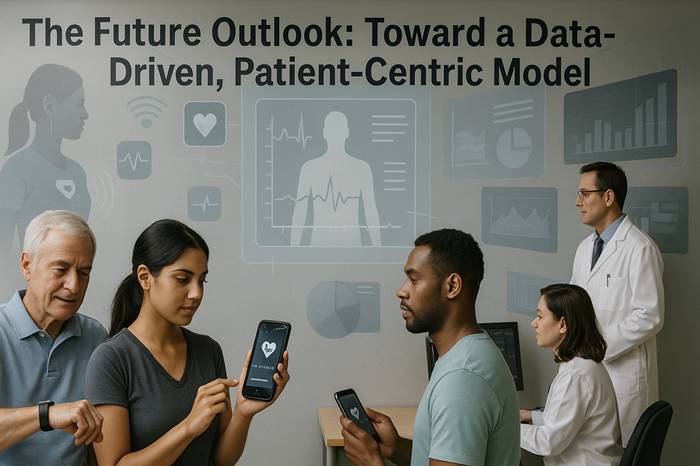The landscape of clinical research is undergoing a seismic shift, powered by technological advancement, shifting patient expectations, and a worldwide drive for more effective and equitable health solutions. Central to these changes is decentralized clinical trials (DCTs), which are changing the paradigms for how we collect, manage, and interpret data. DCTs promise many benefits, as we seek to reinvent the centralised, site-based approach that clinical trials have relied upon for decades. The industry is re-evaluating its approach to clinical trial data, particularly in light of recent world health crises that have made the merit of alternative collection from the traditional site-based process incredibly valuable.
Decentralised trials utilize digitized health technologies, remote patient monitoring, and adaptable logistics to gather data from patients that extends well beyond the walls of the sites. While the innovations of DCT’s promise advanced possibilities that will augment patient diversity, minimise costs, and shorten timelines, there are unique challenges related to data integrity, quality, and regulatory compliance.
The Shift to Decentralised Clinical Trials
Decentralised clinical trials are fundamentally changing the way data is sourced for clinical research. Unlike conventional trials, which are heavily dependent on in-person visits to a central location, DCTs utilise remote technology, mobile devices, wearables, and telehealth platforms to facilitate data sourcing from participant’s homes or local healthcare sites.
Clinical trial data in decentralisation not only expands the geographic and demographic reach of clinical trials but it also increases patient participation. Participants benefit from reduced travel burden and more convenience which leads to greater retention and improved completeness of data. In addition, DCT’s facilitate real-time data collection which assists with constant feedback concerning patient health and treatment effect.
Seeing these new models emerge through advances in digital health care, cloud computing, and data analytics, which, in tandem, are creating a new model of clinical research defined by flexibility, inclusion, and relevance.
The Challenges of Rethinking Clinical Trial Data
Even with these advantages, transitioning to a decentralised model must also mean rethinking how data generated by a clinical trial is managed, validated, and interpreted at its fundamental level. Data accuracy and integrity, which underlie regulatory approvals as well as healthcare decision-making, are of utmost importance, but decentralisation brings with it complexities that confront conventional quality assurance paradigms.
One of the most basic challenges is heterogeneity of data sources. Data derived from wearables, smartphones, and remote monitoring equipment are of potentially very different format, quality, and reliability. In contrast to data from regulated clinical settings, these inputs are under the influence of variability of device calibration, user adherence, and environmental influences. Maintaining consistency across multiple disparate data streams is a challenging task, and new standards for validation and quality control must be established.
In addition, patient privacy and data security are equally important issues. Expansion of digital technologies heightens the risk of data breaches and cyber threats that not only compromise patient confidentiality but may also undermine trial integrity. The regulatory environment is adapting to mitigate these issues, focusing on having strong cybersecurity protocols, encryption of data, and transparent patient consent models.
In addition, the immense amount of data created in decentralised trials requires higher-end analytics capabilities. Efficient management of big data requires powerful data infrastructure, machine learning processes, and trained experts able to extract meaningful insights without sacrificing accuracy.
Rethinking Data Standards and Regulatory Frameworks
Technology has a central role in resolving challenges of decentralised data collection. AI and machine learning programs are being increasingly used to scrub, validate, and interpret massive data streams. These programs can detect anomalies, resolve inconsistencies, and flag potential data quality problems in real time, so that only high-fidelity information drives analysis.
Cloud-based systems can facilitate smooth integration of data from various sources, with centralised dashboards that allow constant monitoring and oversight. Furthermore, innovations in digital biometrics and sensor calibration are enhancing the quality of remote measurements to make them even closer to traditional clinical standards.
Data protection technologies such as end-to-end encryption, multi-factor authentication and using blockchain-based audit trails, continues to protect participants’ privacy and confidentiality as well as data integrity. The rise in these technologies will help build trust across participants, sponsors and regulators therefore enabling wider acceptance of more decentralised research.

The Future Outlook: Toward a Data-Driven, Patient-Centric Model
The future of clinical trials data management for decentralised research will change enormously. Real-world data will not simply exist side-by-side with clinical trial data; but their interplay will lead to integrated, stronger, patient centric datasets capable of adaptive trial design, personalised medicine strategies, and accelerated regulatory review.
Data interaction will be streamlined with standardised data models and improved interoperability frameworks that will automate part of the data sharing and data analysis process. Artificial intelligence and machine learning capabilities will be leveraged to help standardise and improve efficient processes for data checking, risk calculations and outcome predictions reducing the human-on-intervention and improving the efficiency of review and decision processes.
Concurrently, the patient experience will be much more identifiable as individuals participate in a more active role in tracking their health and provide more immersive, value-added datasets. The democratisation of health data collection is mass-shift routed by consumer wearable technology, mobile phones, remote sensors will advance the access to sophisticated therapies and facilitate inventiveness in drug development.
Industry stakeholders are investing significantly in these emerging capacities, understanding that future clinical research will consist of quality, actionable data. Strategic combination of decentralised sources has extraordinary potential to improve the relevance and accuracy of clinical trial results, which ultimately equates to better therapies and patient outcomes.
Conclusion
Reconsidering clinical trial data in decentralisation is an imperative and critical shift for the pharmaceutical and biotech industries. It must adopt a holistic model to drive new standards, incorporate more advanced technologies, and develop regulatory frameworks that support progress, while assuring the integrity of data.
The transition towards decentralised data collection poses significant benefits of inclusiveness, fast timelines, and applicability in real-world settings, but along with those benefits are some serious challenges with regard to data quality, safety, and regulatory acceptability.
By continuously innovating technology and engaging with industry partners and regulators, anticipating a different clinical research landscape that is more agile, more open, and more patient-focused can be reality. As the industry continues to change, it will be imperative to reimagine clinical trial data to enable new therapies that meet unmet medical needs, and ultimately change the way in which healthcare is delivered.
The way forward will be complex but optimistic, one where insights based on data become the foundation of a more effective, dependable, and influential model for clinical research. The future of clinical trials is to embrace this type of activity and ultimately reform our ways of creating knowledge so we may impact health outcomes around the world.























